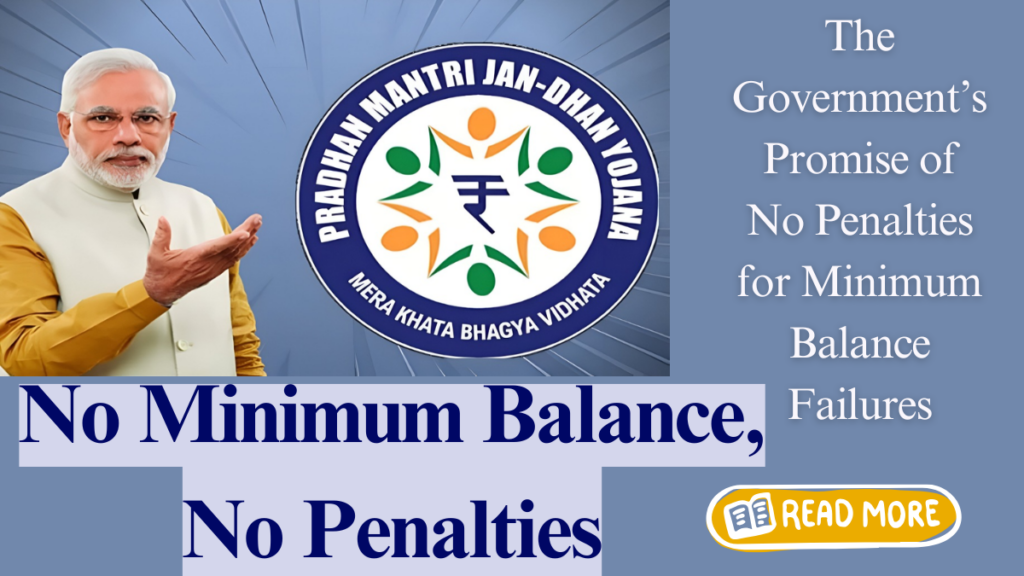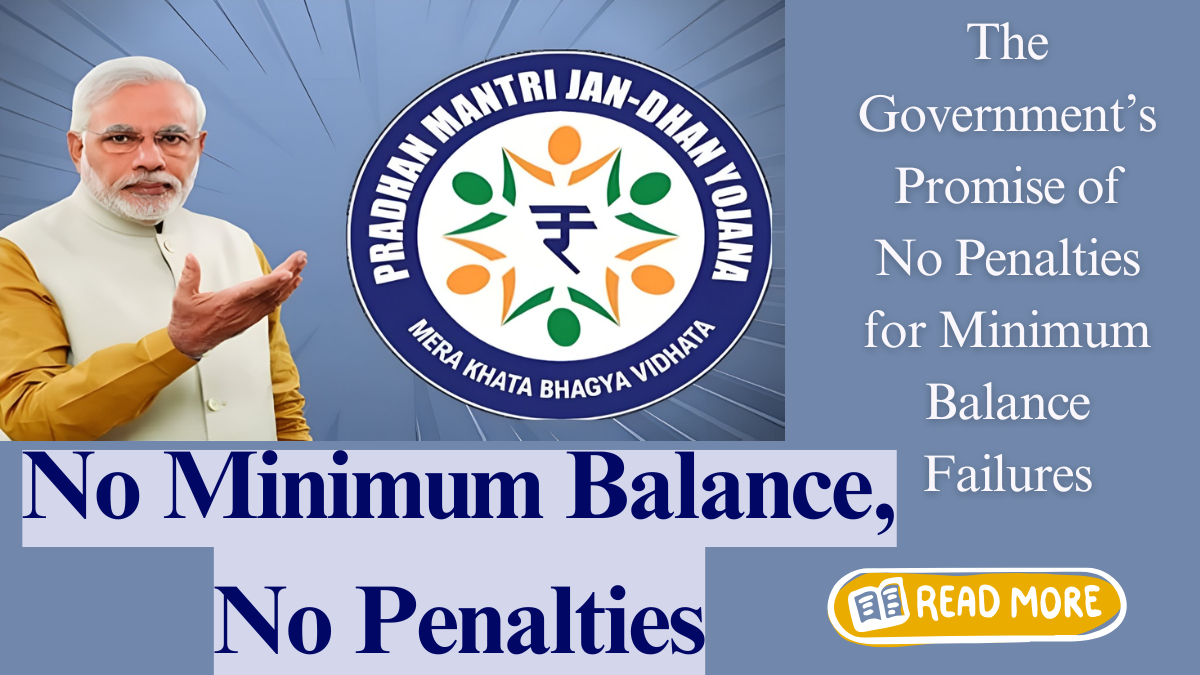In an important clarification made in the Lok Sabha, Shri Pankaj Chaudhary, the Minister of State for Finance, confirmed that Pradhan Mantri Jan Dhan Yojana (PMJDY) account holders will not face penalties for failing to maintain a minimum balance. This information helps dispel confusion and highlights how the government’s flagship financial inclusion scheme benefits account holders, especially those with limited resources.

Introduction to PMJDY and Its Features
The Pradhan Mantri Jan Dhan Yojana (PMJDY) is a government initiative aimed at providing accessible financial services to the underprivileged sections of society, particularly those who previously had no access to banking services. Launched in 2014, this scheme aims to increase financial inclusion by offering zero-balance savings accounts. These accounts are tailored for people who may not have the means to maintain a certain amount in their bank accounts, making it possible for even economically disadvantaged individuals to save money, access insurance, and utilize other banking services.
One of the key features of PMJDY accounts is that they do not require account holders to maintain a minimum balance. This is in stark contrast to regular savings accounts, which typically require account holders to maintain a set amount of money in their accounts at all times.
Recent Clarification in Lok Sabha
In a Lok Sabha session, Shri Pankaj Chaudhary, the Minister of State in the Ministry of Finance, responded to a question about the penalty for non-maintenance of minimum balance in various bank accounts, including those under the PMJDY scheme. In his response, he affirmed that there is no penalty charged on PMJDY accounts for not keeping the minimum balance. This statement effectively clears up any confusion regarding PMJDY accounts and their penalty structure.
This clarification is especially significant, as many people using PMJDY accounts are from economically weaker sections and may not always have the means to keep a specific balance in their accounts. Therefore, the assurance that no penalties will be levied ensures that these individuals can use the accounts without the fear of financial consequences.
Penalty Charges in Regular Savings Accounts
While PMJDY accounts are exempt from maintaining a minimum balance, regular savings accounts in both public and private sector banks are often subject to penalties for failing to maintain the prescribed balance. The Reserve Bank of India (RBI), in its circulars dated November 20, 2014, and July 1, 2015, set out guidelines for imposing penalties on customers who do not maintain the minimum balance in their savings accounts.
As per the guidelines, banks are authorized to impose penalty charges on customers for non-maintenance of the minimum balance. However, there are some key points regarding how these penalties are applied:
- Communication of Requirements: When a savings account is opened, the bank must inform the customer about the minimum balance requirement and any penalties that could be applied for not meeting that requirement. Moreover, any changes to these requirements should also be communicated to the account holder in advance.
- Notification of Penalties: In the event that the minimum balance is not maintained, the bank must send a notification to the account holder. This notification should clearly state the penalties that will be applied if the required balance is not restored within a stipulated time period, usually one month.
- Penalty Calculation: Penalties are generally calculated based on the difference between the minimum required balance and the balance actually maintained in the account. This charge is often a percentage of the shortfall in the required balance.
- No Negative Balance: According to RBI guidelines, banks are prohibited from allowing penalties to push the account balance into a negative territory. This ensures that penalty charges will not result in account holders being further penalized due to a negative balance.
Key Highlights of PMJDY Accounts
PMJDY accounts, on the other hand, do not have any of these stipulations. There is no requirement to maintain a minimum balance, which ensures that account holders, especially those from financially vulnerable backgrounds, are not penalized due to their inability to maintain a certain amount of money in their accounts. This has been a major reason why PMJDY has been successful in promoting financial inclusion.
Apart from the absence of minimum balance requirements, PMJDY accounts come with several other features that make them especially accessible to low-income individuals:
- Zero Balance Requirement: PMJDY accounts are zero-balance accounts, meaning there is no need for account holders to deposit any minimum amount to keep the account operational.
- Overdraft Facility: Account holders of PMJDY accounts are eligible for an overdraft facility up to a certain limit. This facility allows them to withdraw money even if their balance is insufficient, thus providing them with a cushion during financial emergencies.
- Insurance Benefits: PMJDY account holders are provided with accidental insurance coverage, further enhancing the safety net for individuals who may not have access to traditional forms of financial security.
- Direct Benefit Transfer (DBT): PMJDY accounts are linked to government welfare schemes, ensuring that beneficiaries can receive direct benefits like subsidies and other financial assistance directly into their accounts.
Why is This Clarification Important?
This clarification by Shri Pankaj Chaudhary holds particular significance for the people who benefit from the PMJDY scheme. Many of these account holders belong to lower-income groups and often face financial instability. For such individuals, the ability to access banking services without the burden of maintaining a minimum balance is invaluable.
By eliminating the fear of penalties, the government ensures that people are more likely to use the account for savings, insurance, and other financial activities. This also encourages more individuals to open PMJDY accounts, further expanding financial inclusion in India.
Conclusion
In conclusion, PMJDY accounts offer a unique solution to the challenge of financial inclusion by not imposing any minimum balance requirements. This makes banking services accessible to everyone, regardless of their economic status. The no-penalty rule further reinforces the government’s commitment to financial inclusion by ensuring that the most vulnerable sections of society are not excluded due to financial limitations.
For regular savings accounts in public and private sector banks, penalties may apply for non-maintenance of the minimum balance. However, banks must adhere to RBI guidelines, which ensure transparency and fairness in how penalties are levied. In contrast, PMJDY accounts remain a vital tool for those seeking to access basic banking services without the fear of penalties.
Frequently Asked Questions
1. Do I need to maintain a minimum balance in PMJDY accounts?
No, there is no minimum balance requirement for PMJDY accounts, making them a convenient option for those without a steady income.
2. Can PMJDY account holders be penalized for not maintaining the minimum balance?
No, PMJDY accounts are exempt from penalties related to minimum balance maintenance.
3. What happens if I fail to maintain the minimum balance in a regular savings account?
If you fail to maintain the minimum balance in a regular savings account, your bank may impose penalties, as outlined by the RBI guidelines.
4. Are there any penalties for non-maintenance of balance in PMJDY accounts?
No, there are no penalties for non-maintenance of balance in PMJDY accounts, as they do not have a minimum balance requirement.
5. What are the benefits of opening a PMJDY account?
PMJDY accounts offer zero-balance savings, overdraft facilities, insurance coverage, and the Direct Benefit Transfer (DBT) facility, which ensures that financial assistance reaches individuals directly.
Click here to know more.
Pari is a passionate writer known for captivating stories that blend imagination and reality. Inspired by travel, history, and everyday moments, Pari crafts narratives that resonate deeply with readers.
